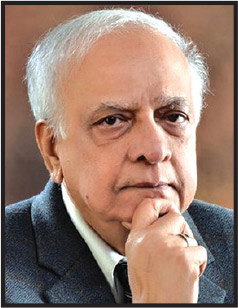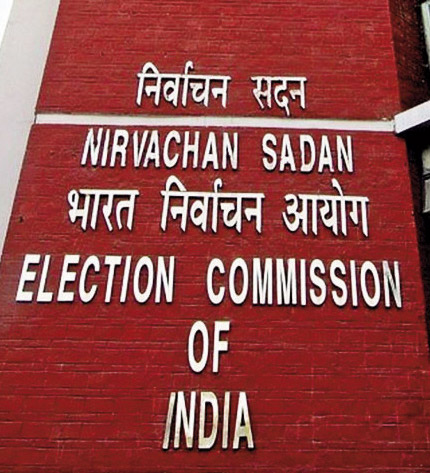Transparency in political
funding a must
 Hari Jaisingh
Hari Jaisingh
 One major grey area
of India’s system of
governance is the
absence of
transparency and
a c c o u n t a b i l i t y
among politicians and political
parties in electoral funding. As it is,
the people have often expressed
grave concern about the growing
sickness in the polity, the general
state of drift, mounting corrupt
practices, the unresponsive system
and declining ethical values. These
generalized observations have
thrown up various suggestions that
seek modest to radical
constitutional changes. Even the
scrapping of the Constitution has
often been mooted in favour of a
presidential form of government.
Also in the air are stray thoughts
for a Second Republic.
One major grey area
of India’s system of
governance is the
absence of
transparency and
a c c o u n t a b i l i t y
among politicians and political
parties in electoral funding. As it is,
the people have often expressed
grave concern about the growing
sickness in the polity, the general
state of drift, mounting corrupt
practices, the unresponsive system
and declining ethical values. These
generalized observations have
thrown up various suggestions that
seek modest to radical
constitutional changes. Even the
scrapping of the Constitution has
often been mooted in favour of a
presidential form of government.
Also in the air are stray thoughts
for a Second Republic.
Perceptions vary. So do
responses. No ready-made
solutions are available, especially
in view of the fact that the type of
commitment necessary to tackle
complex problems is lacking. More
than theoretical solutions, what is
required is a proper understanding
of what young and old voters want.
Unless our solutions reflect their
genuine hopes and expectations,
they are bound to fail. India is too
large a nation to be moved by
short-cuts and over-simplifications
of problems.
The Central Government told
the court that Electoral
Bonds would promote
transparency and
accountability in funding
and donations received by
political parties. Does this
claim stand the test of logic
and actual practice? Not at
all. It appears that the policymakers at the helm had not
done their homework
properly.
Take the oversimplified matter
of Electoral Bonds which the BJPled NDA government launched
with great fanfare. Later, in
response to the petition filed by
the Association of Democratic
Reforms (ADR), the Supreme Court questioned the basic soundness of
the scheme.
The Central Government told
the court that Electoral Bonds
would promote transparency and
accountability in funding and
donations received by political
parties. But, does this claim stand
the test of logic and actual
practice? Not at all. It appears that
the policy-makers at the helm had
not done their homework properly.
This is clear from the Election
Commission’s letter written to the
Ministry of Law and Justice as far
back as 26 May 2017 wherein it
had underlined to the Ministry of
Law and Justice.
The EC had pointed out that the
amendments made to Section 29C
of the Representation of People’s
Act 1951 (RPA), whereby political
parties are not supposed to report
it the donations received through
electoral bonds, would go against
the very concept of ensuring
transparency in political funding.
In fact, the ECI has rightly dubbed
this as a “retrograde step” and
called for withdrawal of the
amendments.
Explaining the position, the ECI
has stated:
 “In a situation where
contributions received through
Electoral Bonds are not reported
on perusal of the contributions, it
cannot be ascertained whether the
political party has taken any
donation in violation of provisions
under Section 29-B of the RP Act of
1951. It prohibits the political
parties taking donations from the
government companies and foreign sources”
“In a situation where
contributions received through
Electoral Bonds are not reported
on perusal of the contributions, it
cannot be ascertained whether the
political party has taken any
donation in violation of provisions
under Section 29-B of the RP Act of
1951. It prohibits the political
parties taking donations from the
government companies and foreign sources”
The ECI went to the extent of
saying that the whole exercise
would encourage donations by
“shell companies”. No wonder,
every provision of ensuring
transparency in the system of
funding thus stands exposed. This
is a pity.
Looking back, while notifying
the scheme, the Centre had
claimed that Electoral Bonds would
mainly be purchased by an Indian
citizen or companies incorporated
in India. It was also said that the
identity of the donor will be known
only to the bank, which “will be
kept anonymous.
Interestingly, the biggest
beneficiary of the scheme happens
to be the ruling party. Most of the
bonds that have been purchased in
the denominations of Rs 10 lakh
and 1 crore show that the scheme
with the requisite amendments of
the various Acts were meant to
favour the BJP since as many as 95
per cent of the electoral bonds
have reportedly been sold to the
BJP. This is understandable since
the corporate sector is known to
tilt in favour of the ruling
establishment in giving donations.
There is no Left or
Right in corruption.
Practically, all parties
thrive on black
money because it
frees politicians from
the process of
accountability. Who
cares if the common
man is drowned in
misery in the
process? The present
ruling BJP leadership
needs to have a
second look at
Electoral Bonds.
Transparency and
public accountability
have to be part of our
working in
democracy.
We have reasons to feel
concerned about these
developments, if we closely
examine the “electoral money
pipelines”. This is not only the
question of quantum but also the
very dimension of the operations.
This could eat into the vitals of the
nation, raising the basic question
of transparency, accountability.
Reversing the corruption-prone
trend will not be easy. This
demands right attitudes and
political will to break the vicious
circles of black money generation.
The political leadership must act.
The situation is alarming.
According to a Hindu report, eighty
per cent of our present Members
of Parliament are crorepatis today.
Viewed in this light, the
administrative and electoral
reforms hold the key to building
cleaner polity. Fairness and fair
play in the system can put a stop to
the current drift in money-making
devices. Instead of indulging in
shadow-boxing against corrupt
practices, the Indian rulers would
do well to take steps which should
tackle the roots of the problem.
Let us not forget the basic fact
that big money spent during
elections generates black money
manifold. We know that votes and
notes go together in our existing
electoral system. What will be the
quality of our democracy
conducted by dubious means or
falsehood? Will not tainted money
produce tainted democracy?
There is, of course, no Left or
Right in corruption. Practically, all
parties thrive on black money
because it frees politicians from
the process of accountability. Who
cares if the common man is
drowned in misery in the process?
I suggest the present ruling BJP
leadership to have a second look at
Electoral Bonds. Transparency and
public accountability have to be
part of our working in democracy.
In this context, I wish to state
that financial and electoral reforms
need to be viewed in a larger
national framework and not as an
exercise in money making to fill
personal and party coffers. The
world’s largest and most vibrant
democracy of ours requires quality
control and not double-speak and
double standards!



